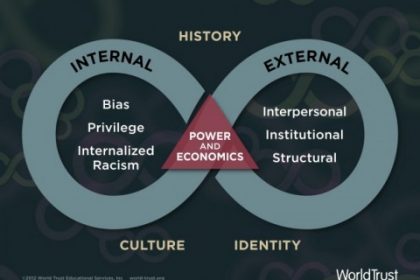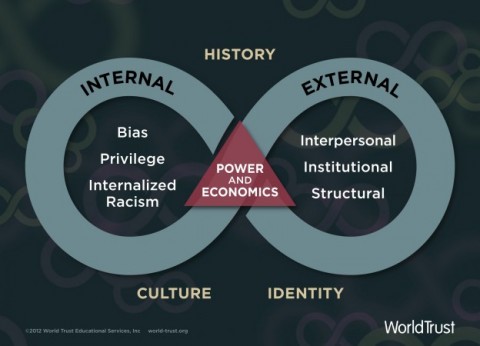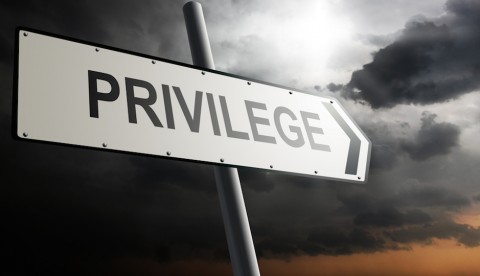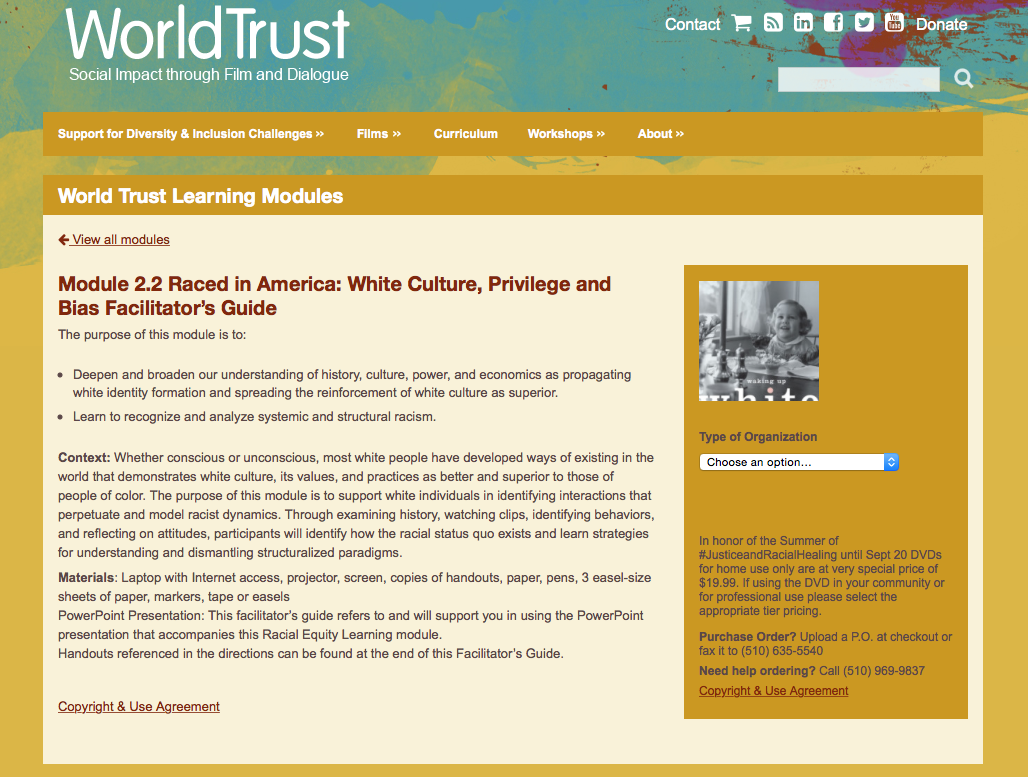
This post was originally published on the Interaction Institute for Social Change’s blog by Curtis Ogden on August 6, 2015.
“Processes aimed at racial equity change can overlook the privileged side of inequity.”
-Gita Gulati-Partee and Maggie Potapchuk, “Paying Attention to White Culture and Privilege: A Missing Link to Advancing Racial Equity”
 In a number of social change networks that I support, racial equity is being put at the center of the work, whether or not that was the initial impetus for coming together. This is not seen as ancillary to the change effort, but now understood as foundational, in that systemic inequity around race is a significant part of the water in which we swim. In a few of these networks where there is a majority of white participants, increasing numbers of people are asking what they can do about structural racism, and one response is that there is important work to be done around whiteness and white privilege. As Gita Gulati-Partee and Maggie Potapchuk point out, this is often a critical missing link in racial equity work.
In a number of social change networks that I support, racial equity is being put at the center of the work, whether or not that was the initial impetus for coming together. This is not seen as ancillary to the change effort, but now understood as foundational, in that systemic inequity around race is a significant part of the water in which we swim. In a few of these networks where there is a majority of white participants, increasing numbers of people are asking what they can do about structural racism, and one response is that there is important work to be done around whiteness and white privilege. As Gita Gulati-Partee and Maggie Potapchuk point out, this is often a critical missing link in racial equity work.
A first step is to understand what “white culture” is. Again, Gulati-Partee and Potapchuk:
“By ‘white culture,’ we mean the dominant, unquestioned standards of behavior and ways of functioning embodied by the vast majority of institutions in the United States. Because it is so normalized it can be hard to see, which only adds to its powerful hold. In many ways, it is indistinguishable from what we might call U.S. culture or norms – a focus on individuals over groups, for example, or an emphasis on the written word as a form of professional communication. But it operates in even more subtle ways, by actually defining what ‘normal’ is – and likewise, what ‘professional,’ ‘effective,’ or even ‘good’ is. In turn, white culture also defines what is not good, ‘at risk,’ or ‘unsustainable.’
This can be difficult for white people to take in or accept (speaking from personal experience), because white privilege is hard to see, because we may not want to see it and/or we don’t like the idea of giving it up. This lays out the necessarily multi-dimensional work of helping more of us to see and understand white privilege, deal with some of the emotions that come up around it (without lapsing into unhelpful defensive behavior – see “white fragility“) and lift up what is to be gained from doing this work.
In the year since Ferguson and with the growing #BlackLivesMatter movement, it has been heartening to see increasing numbers of white people talking and concerned about racism and white privilege. This has taken some more mainstream and public forms, including an ongoing column in the New York Times hosted by George Yancy in which he interviews a variety of thinkers about race, racism and privilege (see Naomi Zack and Judith Butler below). As a practice I regularly circulate these writings to the networks I support as a way of helping to normalize the conversation, which feels like a signifcant part of the work. In this same spirit, here are a few I have shared with selected excerpts:
- What “White Privilege” Really Means – “The term ‘white privilege’ is misleading. A privilege is special treatment that goes beyond a right. It’s not so much that being white confers privilege but that not being white means being without rights in many cases. Not fearing that the police will kill your child for no reason isn’t a privilege. It’s a right. But I think that is what ‘white privilege’ is meant to convey, that whites don’t have many of the worries nonwhites, especially blacks, do.” – Naomi Zack
- 11 Ways White America Avoids Taking Responsibility for its Racism – “When you understand racism as a system of structured relations into which we are all socialized, you understand that intentions are irrelevant. And when you understand how socialization works, you understand that much of racial bias is unconscious. Negative messages about people of color circulate all around us. … The societal default is white superiority and we are fed a steady diet of it 24/7. To not actively seek to interrupt racism is to internalize and accept it.” – Robin Diangelo
- What’s Wrong With “All Lives Matter”? – “Whiteness is not an abstraction; its claim to dominance is fortified through daily acts which may not seem racist at all precisely because they are considered ‘normal.’ But just as certain kinds of violence and inequality get established as ‘normal’ through the proceedings that exonerate police of the lethal use of force against unarmed black people, so whiteness, or rather its claim to privilege, can be disestablished over time. This is why there must be a collective reflection on, and opposition to, the way whiteness takes hold of our ideas about whose lives matter.” – Judith Butler
- I, Racist – “White people and Black people are not having a discussion about race. Black people, thinking as a group, are talking about living in a racist system. White people, thinking as individuals, refuse to talk about ‘I, racist’ and instead protect their own individual and personal goodness. In doing so, they reject the existence of racism.” – John Metta
In addition, at IISC we have found sharing film clips, including the one above from Shakti Butler’s Cracking the Codes: The System of Racial Inequity, to be helpful in deepening understanding among white people of white privilege and how white privilege being aware of itself can be leveraged in productive ways, towards equity.
And a few additional recommended resources, a number courtesy of my colleague Cynthia Silva Parker:
- What is a System of Privilege?
- A Definitive Guide to White Privilege
- Explaining White Privilege to a Broke White Person
- 9 clueless things white people say when confronted with racism
- Tools for White Guys who are Working for Social Change… and other people socialized in a society based on domination

Also check out the World Trust module, which features the work of Debby Irving, author of Waking Up White.
Eager to hear reactions, stories and other resources/ideas.
How are you considering whiteness and white privilege in your networks and collective impact efforts for change?
Curtis Ogden is a Senior Associate with the Interaction Institute for Social Change (IISC) and a member of the FSNE Network Team. He supports a variety of food system-focused networks through his work at IISC. Curtis lives in Amherst, MA with his wife and three daughters.



